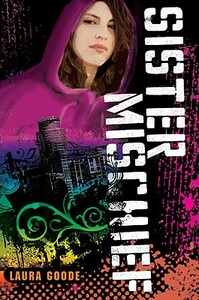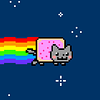Take a photo of a barcode or cover
I wanted to love this book because the blurb made it sound awesome but it was mostly hip hop name dropping and the same tired fight the establishment deal with being a queer teen love someone you cant have story. Boring.
Disclaimer: I'm white and, while a trans man, am still a man and so my opinion on this book should not be taken over that of queer women and women of color.
What first drew me towards this book was the premise. I loved the idea of girls in high school exploring love and life through the medium of hip-hop. I was very much here for the Jewish MC falling for the "Desi chick on the stick" as the book's summary describes her. I'm all for stories where high schoolers stand up to the administration because that is true to life. Teens don't just stand around and deal with shit when it's not right, they stand up and they make themselves heard. I'm also glad that our main character didn't have to deal with homophobia at home on top of all the junk at school.
Where this story gets a little cringey for me is the discussion of whether or not their appreciation and performance of hip-hop is culturally appropriative. Not because it is or isn't, because I don't think it's my place to decide that, but the dialogue felt more like the author trying to assuage her own worries rather than the characters having that kind of discussion. Again, I can't say for certain, but the fact that these girls do constantly call back to other artists and acknowledge where the genre of hip hop came from does give them at least a little bit of leeway because there is a difference between taking something and claiming it as your own without acknowledging it's true roots, and appreciating something and taking part in it without trying to erase the origins of that piece of culture.
I also think that the romance in the story was overall disappointing. Sure, it has a sense of realism to it, but I don't think it's fair to put the internalized homophobia on the one main character of color just because of where her family is from. There are plenty of people of color who are accepting, just as many as there are white people who aren't. It feels like a disservice to queer people of color, like they don't deserve to live the open and free life that our main white character does.
I think, overall, this book is decent. I'm not going to hate on the book for being too message-centric because I think it's important for YA to do that sometimes. The writing was fun, I liked the characters, and the rhymes were extremely entertaining. I would love to see a movie adaptation of this honestly, I think it would be very easy to transform into another medium.
What first drew me towards this book was the premise. I loved the idea of girls in high school exploring love and life through the medium of hip-hop. I was very much here for the Jewish MC falling for the "Desi chick on the stick" as the book's summary describes her. I'm all for stories where high schoolers stand up to the administration because that is true to life. Teens don't just stand around and deal with shit when it's not right, they stand up and they make themselves heard. I'm also glad that our main character didn't have to deal with homophobia at home on top of all the junk at school.
Where this story gets a little cringey for me is the discussion of whether or not their appreciation and performance of hip-hop is culturally appropriative. Not because it is or isn't, because I don't think it's my place to decide that, but the dialogue felt more like the author trying to assuage her own worries rather than the characters having that kind of discussion. Again, I can't say for certain, but the fact that these girls do constantly call back to other artists and acknowledge where the genre of hip hop came from does give them at least a little bit of leeway because there is a difference between taking something and claiming it as your own without acknowledging it's true roots, and appreciating something and taking part in it without trying to erase the origins of that piece of culture.
I also think that the romance in the story was overall disappointing. Sure, it has a sense of realism to it, but I don't think it's fair to put the internalized homophobia on the one main character of color just because of where her family is from. There are plenty of people of color who are accepting, just as many as there are white people who aren't. It feels like a disservice to queer people of color, like they don't deserve to live the open and free life that our main white character does.
I think, overall, this book is decent. I'm not going to hate on the book for being too message-centric because I think it's important for YA to do that sometimes. The writing was fun, I liked the characters, and the rhymes were extremely entertaining. I would love to see a movie adaptation of this honestly, I think it would be very easy to transform into another medium.
This book reminded me of David Levithan's YA stuff, in these girls are way too smart and well-spoken to resemble real teenagers in any way. They all talk like they are in a graduate level women's studies seminar at all times. Which is fine--I love reading sassy teen girls talk about representations of sexuality in hip hop. (I love David Levithan's overly-educated teenagers, too.)
The friendship between the members of Sister Mischief, an all-girl hip-hop crew in suburban Minnesota, felt realistic, even if their dialogue didn't. Their dialogue (and raps) are hilarious and heartfelt.
The friendship between the members of Sister Mischief, an all-girl hip-hop crew in suburban Minnesota, felt realistic, even if their dialogue didn't. Their dialogue (and raps) are hilarious and heartfelt.
I read 250 pages, which is more than half, but I wasn't compelled by the characters. They all read as merely their issues and not as fully fleshed characters worth pulling for. And when everyone is identified by their issue at hand, it's hard to buy where there's an issue about issues, period (that does make sense). For a book about an all chick hip hop band, there wasn't enough hip hop band in it.
All I have to say is that I loved this book. There are so few LGBTQ characters in fiction, especially females, that this book was a breath of fresh air. The story line was solid and believable. I fell in love with the characters and wanted more. I will definitely read any other book that Laura decides to write.
I had very high hopes for this book. A Jewish, lesbian, teenaged MC and her all-female rap collective take on their school when their principal bans hip-hop. How could this possibly go wrong?
Well.
I try not to ascribe motivations to an author because really, who can ever say for sure what was going through an author's head when they were writing. But you have to go far, far out of your way to write a book about a four girl hip-hop group with zero black girls. Three of the girls are white, and one is Indian. Within the book, the girls even discuss how messed up it is:
"'Don't you ever wonder if hip-hop really belongs to us?' Tess asks. 'It had to travel from black urban areas to the radio and MTV to the suburbs...all of a sudden what used to be a black-owned industry moves to bigger labels owned by old white men, and this is how a movement born out of poverty and oppression arrives in our tender hands.'"
Excellent observation, Tess. But what do the other characters say in response? "'Your white guilt is overpowering,' Macy mutters."
Excuse me?
Now, I'm not the one to say whether or not white people belong in hip-hop in the real world. But I know for damn sure that if you are making up a whole set of characters, regular teenagers who could be anybody, there is no reason for them to be so white, unless you genuinely believe that "regular suburbian teenagers" automatically means "white."
Further on, a lot of other gems come up. For example, the book explicitly states that only white people and first-generation Asians live in the suburbs. The black kids that go to the school are all bused in from poor areas (because black people can't be middle class, apparently). The Asian characters are all either refugees from war-torn countries or first-generation immigrants, because Asian-Americans haven't lived in the suburbs of the United States for generations in this universe. At one point the protagonist remarks that a boy adopted from Guatemala is so cute and loving you barely even notice he's missing an arm (oh those plucky brown orphans!) What. The. Hell.
I always keep an eye out for gay-positive YA, because I work at a public library and I know we need more books that are queer, especially ones that aren't all about coming out. But I can't in good conscience recommend this one.
Well.
I try not to ascribe motivations to an author because really, who can ever say for sure what was going through an author's head when they were writing. But you have to go far, far out of your way to write a book about a four girl hip-hop group with zero black girls. Three of the girls are white, and one is Indian. Within the book, the girls even discuss how messed up it is:
"'Don't you ever wonder if hip-hop really belongs to us?' Tess asks. 'It had to travel from black urban areas to the radio and MTV to the suburbs...all of a sudden what used to be a black-owned industry moves to bigger labels owned by old white men, and this is how a movement born out of poverty and oppression arrives in our tender hands.'"
Excellent observation, Tess. But what do the other characters say in response? "'Your white guilt is overpowering,' Macy mutters."
Excuse me?
Now, I'm not the one to say whether or not white people belong in hip-hop in the real world. But I know for damn sure that if you are making up a whole set of characters, regular teenagers who could be anybody, there is no reason for them to be so white, unless you genuinely believe that "regular suburbian teenagers" automatically means "white."
Further on, a lot of other gems come up. For example, the book explicitly states that only white people and first-generation Asians live in the suburbs. The black kids that go to the school are all bused in from poor areas (because black people can't be middle class, apparently). The Asian characters are all either refugees from war-torn countries or first-generation immigrants, because Asian-Americans haven't lived in the suburbs of the United States for generations in this universe. At one point the protagonist remarks that a boy adopted from Guatemala is so cute and loving you barely even notice he's missing an arm (oh those plucky brown orphans!) What. The. Hell.
I always keep an eye out for gay-positive YA, because I work at a public library and I know we need more books that are queer, especially ones that aren't all about coming out. But I can't in good conscience recommend this one.
four smart, kinda-nerdy teens in a wealthy christian suburb of minneapolis become rappers. this premise could have gone REALLY wrong, but it's actually great--a page-turning, laugh-out-loud kind of way. i love the snarkiness and bad behavior and bad language of the characters, because it's how teens really talk. i wish i knew these ladies. i love that they have a talk within the first fifty pages about whether or not it's okay for them to be rapping as mostly-white suburban teens. their conversation is smart, not kneejerk reactionary and they don't all agree in a neat little bow. i thought it was weird how the one nonwhite girl is sometimes "bengali" and sometimes "indian". seems like the author did her research on a lot of other things, why does she think that these are the same country?! but i was still mostly charmed by this book. these characters have great taste in music.
I... still don't know what to think of this book. I have it two because it was earnest and well-written and appeared genuine. But I don't know what to think frankly.





